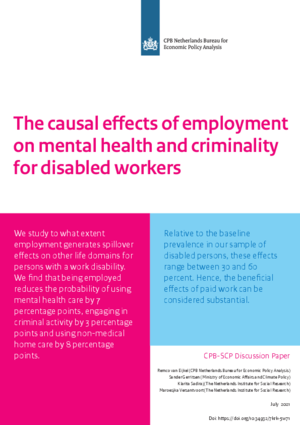July 22, 2021
DOI: 10.34932/7krk-5w71
The causal effects of employment on mental health and criminality for disabled workers
In this paper, we study to what extent employment generates spillover effects on other life domains for persons with a work disability. We find that that paid work reduces the probability of using mental health care by 7 percentage points, engaging in criminal activity by 3 percentage points and using non-medical home care by 8 percentage points. Relative to the baseline prevalence in our sample of disabled persons, these effects range between 30 and 60 percent.

Increasing labor participation of disabled workers thus generates beneficial effects on other important life domains like health and social behavior. This not only benefits disabled workers in the form of a higher quality of life and lower out-of-pocket payments on health care, but also society as a whole in the form of lower public expenditures on health care and crime. Our paper therefore contributes to a better understanding of the full benefits of activation policies targeted at disabled people.
Downloads
Authors
Remco van Eijkel
Sander Gerritsen (Ministry of Economic Affairs and Climate Policy)
Klarita Sadiraj (SCP, The Netherlands Institute for Social Research)
Maroesjka Versantvoort (SCP, The Netherlands Institute for Social Research)
